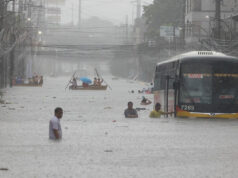NEDA wary of risks from Delta variant

THE National Economic and Development Authority (NEDA) stressed the need to hasten the rollout of vaccines, particularly in areas with high infection rates, amid risks from fast-spreading coronavirus disease 2019 (COVID-19) variants.
“We recognize the higher risk brought about by the Delta variant,” NEDA Secretary Karl Kendrick T. Chua told reporters in a Viber message on Monday.
“Our effort should be on accelerating vaccine deployment. As supply resumes next week, we will exert effort to increase vaccination centers, including in malls and workplaces, and prioritizing areas of highest risk of infection,” he added.
Mr. Chua said the threat of the new COVID-19 variants can be dealt with if the government improves health protocols and only impose localized lockdowns on areas with high infections.
Infectious disease expert Rontgene M. Solante, who is also a member of the state vaccine expert panel, reportedly recommended that Metro Manila and other areas with high infection rates remain under a general community quarantine until December when 40% of the population are expected to be vaccinated.
The World Health Organization has said the more infectious Delta variant, which first emerged in India, is on track to become the world’s dominant strain.
As of last week, the Health department said there are still no reported local case of the Delta variant, since the previous 19 cases came from returning overseas Filipinos and foreigners.
‘MOST VULNERABLE’
The Philippines is one of the economies most vulnerable to the Delta variant, along with Peru, Colombia, South Africa and Thailand, according to a July 8 research note by JPMorgan.
The investment bank cited the country’s low vaccination rate relative to its total population as it could delay the economy’s recovery.
As of July 4, the Health department said 2.86 million have been fully vaccinated against COVID-19, less than 3% of the population.
Around 50% of the total population or 75% of the adult population need to be vaccinated for mobility to return to its pre-pandemic level and economic recovery to pick up, JPMorgan said.
JPMorgan estimated the Philippines could only reach the vaccination threshold by the third quarter of 2023, and the economy to return to its pre-crisis level by the third quarter of next year.
“The model estimates suggest that the Philippines, Peru, South Africa, Thailand, and Colombia face the longest journeys back to pre-pandemic levels of mobility, while Singapore, Turkey, India, and Brazil have the shortest journeys,” the report said.
Meanwhile, think tank Moody’s Analytics on Monday also warned of the potential risks if quarantine restrictions will be loosened prematurely since the Delta variant is still spreading fast across Asia-Pacific.
This as the government considers easing restrictions in Metro Manila and its nearby areas since the daily tally of new infections have gone down from the peak in April.
“The Philippines is still dealing with cases of around 4,000 which is quite significant. Given that social distancing in the Philippines has increased a little bit, that increases vulnerability of the Philippines to that Delta strain,” Katrina Ell, senior economist for Asia-Pacific at Moody’s Analytics, told One News in an interview on Monday.
She said the country will keep “underperforming” if its vaccination program will not accelerate and it continues to struggle containing the outbreak.
“One of the key upsides is the increase in vaccine supply that appears to be coming online… [given the expected delivery of Johnson & Johnson vaccines this month], which only needs one dose to be considered fully vaccinated… This one dose is positive because that means the Philippines can speed up the campaign to fully vaccinate their population,” Ms. Ell added.
The Health department reported 5,204 new COVID-19 infections in the country on Monday, bringing the total number of active cases to 49,128.
Economic managers are expecting the economy to grow by 6-7% this year. — Beatrice M. Laforga



